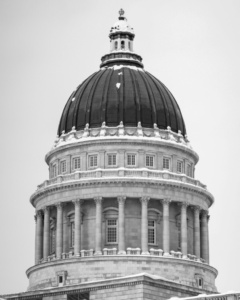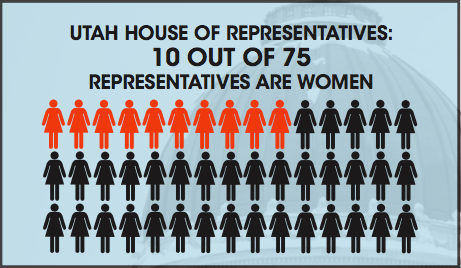A group of women elected to the United States Senate in 1992 inspired the “Year of the Woman.” But here we are a quarter of a century later and female political perspectives are few and far between and women make up less than half of each level of office. There is no excuse for why women should not be politically involved. Yes, the vast majority of politicians in Utah are men and yes, there are significant inequalities experienced by women and men alike — both economic and based in opportunity — however, we should all be equal in our political voice.
The formation of this country was largely due to unrest within a group of people who felt they were unfairly represented, or not represented at all. No one should feel like they don’t have a voice in their country. In a perfect world our political offices would be filled by people from all backgrounds. We aren’t there quite yet, but on Nov. 8, Catherine Cortez Masto (a Latina), Ilhan Omar (a Somali-American), and Pramila Jayapal (a South Asian) were all voted into positions of power at the local level.
According to the National Conference of State Legislatures, there are 1,805 women who serve in the state legislatures of the U.S. as of 2016; 16 of those are in Utah. In 2015, there were 1,800 women serving. While the number of women serving is increasing, this increase should be put into perspective: if the number of women continues to increase at a rate of five women per year, and assuming the number of seats in the state legislatures remains constant, it would take almost 750 years for there to be a roughly equal number of women and men. In the Utah House of Representatives, out of the 75 representatives, only 10 are women and out of the 29 Utah state senators only six are women. It’s clear that a strong female perspective is missing from the conversation. While these are not exactly inspiring numbers, Utah does have noteworthy female politicians who serve as excellent examples for women aspiring to get into politics, especially at the local level where real change takes root.
In 1992, the first female mayor was elected in Utah, Deedee Corradini. Corradini was a Democrat who she served two terms as mayor of Salt Lake City. Despite the fact that Salt Lake City has, been a liberal pocket in an otherwise conservative state, electing and reelecting a female mayor was a memorable milestone for the city and the women who lived there. In January 2016, Jackie Biskupski, the second female — and first openly gay — mayor of Salt Lake City was sworn into office, more than two decades after Corradini cracked the glass ceiling. In addition to being a champion for LGBTQ+ rights, Biskupski brought climate change and air quality — a critically characteristic issue in the Salt Lake Valley — to the forefront of her platform.

However, political progress (despite gender) is not easily accomplished. Biskupski and the Salt Lake City council have not always seen eye to eye on certain subjects, and in a recent meeting between Biskupski and the city council, the atmosphere was described as “icy” by Salt Lake Tribune reporter Christopher Smart. Despite the disagreements, Biskupski maintains her faith in the community and she encourages people to engage in politics. In a recent blog post Biskupski states she is “…heartened by the many residents who, while struggling to accept recent political changes, are choosing to take positive action over resorting to anger and despair.” In the same post, Biskupski noted that “…as a woman who has pushed back against gender-based discrimination for decades, I want to underscore my commitment to create greater opportunities for women in leadership, administration, and citywide employment.”
Many people think women have tunnel vision when it comes to policy making. Contrary to what may sometimes seem like popular belief, “women’s issues” in the political arena are not exclusively reproductive rights and equal pay. To say this is nothing less than perpetuating the idea that women in the political realm should be treated differently. On the opposite side, reproductive rights, as well as equal pay, are just as relevant to men as they are to women. Family planning and equal pay for equal work affects both sides of the aisle. Women’s issues include prison reform, military spending, immigration, government bailouts, the capital gains tax and many more. These issues are as much men’s as they are women’s — they affect men and women across the entire political and socioeconomic spectrum.
Aimee Winder Newton, a Republican on the Salt Lake County Council since 2014 — and a mother of four — takes on powerful issues, as she says on her website, such as “increasing government transparency, improving our criminal justice system and striving for greater budget accountability.” No small tasks. “I love local government because it impacts our day to day life the most,” Newton said in an emailed statement. “We need to elect good leaders who can champion a strong economy and help our community thrive.”
Electing effective leaders means looking for people capable of making intelligent and informed decisions who also act in the public’s best interest — people who genuinely care about their communities regardless of race, religion, class or creed. Newton is a firm believer that a “government closest to the people governs best.”
Newton, a Republican, and Biskupski, a Democrat, both bring strengths to the table. “I know that whether Democrat or Republican, women bring shared and valuable life experiences to the political arena. We may have different styles or agendas, but our presence in the debate and in driving the policy shifts the conversation,” Biskupski said in an emailed statement.
Women absolutely need to be involved in political discourse. Women and men alike should aspire to be good leaders. “I don’t believe we should ever vote for a candidate because of gender, but the more we can have women at the table and as part of the political process, the better,” Newton said.
Let’s not forget that the women of this country have only had the right to vote for less than a century. Voting is a right and many think it is a civic duty, but it is also a choice. Getting politically involved is also a choice, and it is not one to take lightly. “As women, we tend to wait for the perfect time to do this. We are accustomed to waiting and doing for others before we do for ourselves. If we wait, we can always find a reason to delay, and delaying means one more week, month or year our voices go unheard,” Biskupski said.
Do your friends, your community and your country a favor and never take opportunities to participate in democracy for granted — opportunities that are not limited to once every four years.
@kamrynlinda


